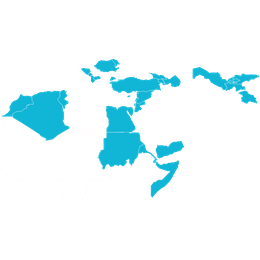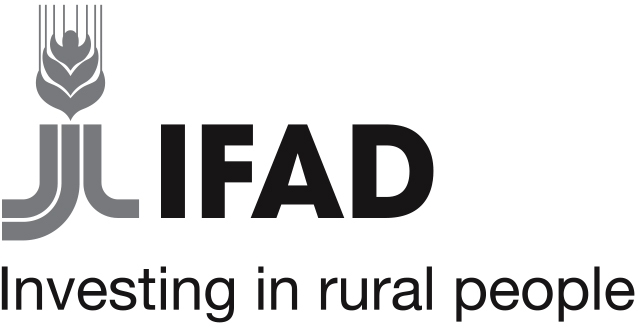Boosting food security through multi-national innovation ‘corridors’
"The implementation of the pilot created a boost in resilience and self-organization."
BACKGROUND
Natural resource management is crucially important in dry areas, and agricultural practices can have a major impact on water consumption. Through collaborative ‘corridors,’ countries with similar environmental and social profiles can exchange innovative resource-management solutions, build food security, and improve opportunities for women and youth.
WHAT’S INVOLVED
Cross-border knowledge sharing
Thanks to the international reach of the project, relevant solutions can be shared between countries and communities with similar development goals and pain points, particularly in relation to water use and resource management in arid areas.
Empowering youth and women
Providing opportunities for women and young people was a core objective of the project right from the start. The implementation of the pilot created a boost in resilience and self-organization among these groups.
EXPLORE THIS SOLUTION
The corridors project can offer
- A wealth of knowledge from a broad base of stakeholders experienced in cross-border SSTC implementation
- Knowledge of promoting opportunities for women and youth in rural contexts

Countries involved
Algeria, Egypt, Hungary, Morocco, Sudan, Tunisia, Turkey and Uzbekistan
Project partners
UN Office for South-South Cooperation (UNOSSC), Egypt’s National Water Research Center, Hungarian Agricultural Biotechnology Center, Turkey International Agriculture Research and Training Center, Egyptian Fund for Technical Cooperation with the Commonwealth, Islamic European States and Newly Independent States, Hungarian IDC IC – Interdepartmental Committee for International Development Cooperation, TIKA – Turkish International Cooperation and Development Agency
Project dates
2014 - 2019
Share this solution
Bookmark this solution
BookmarkShow Full Solution
Summary
A series of cross-regional South-South and Triangular Cooperation (SSTC) exchanges were set up across the Near East, North Africa and Europe (NEN) region and central Asia, focusing on the transfer of effective and workable southern solutions for agricultural development priorities. These included sustainable community-level natural resource management, scaling-up workable solutions to water use for agriculture in dry lands, increasing agricultural production and productivity, and generating gainful employment opportunities for youth and women.
Challenge
Sustainable natural resource management is vitally important in dry areas where water is both scarce and precious. This is particularly true for Arab countries, which have the lowest per capita water availability in the world. Other countries in the NEN region are facing similar issues.
About 70 per cent of the fresh water consumed in the world goes to agriculture, an industry in which water efficiency is especially low. For countries in the NEN region, efficient use of water combined with increased agricultural productivity is a high priority. At the same time, more populous countries of the region with high levels of population density and poverty face depleting levels of natural resources.
Solution
Agricultural solutions and technologies are transferred along three cross-regional South-South ‘corridors’, led by locally-based institutions. The solutions promote improved water efficiency, natural resource management, and household food security.
The main objective of the exchanges is to effectively increase food and water security and alleviate rural poverty among youth and women in selected communities in Algeria, Egypt, Morocco, Tunisia and Uzbekistan.
The project adopts a demand-driven participatory approach based on the exchange of information and experience between participating countries.
The strategy of using corridors (technical exchanges between a number of countries) is based on the idea that solutions successfully implemented in one country are likely to succeed in other countries with similar agricultural and demographic characteristics.
More specifically, the exchanges are designed to give young people and women access to financial services, introducing new sustainable agricultural practices like conservation agriculture, providing food policy-related recommendations, and sharing lessons learned across regions.
The project also promotes the development of national capacities and the establishment of long-term partnerships.
The three exchange corridors are:
- from Arab States to Central Asia and Eastern Europe, focusing on expertise in sustainable water resources management and supported by Egypt;
- from Eastern Europe to Arab States and Central Asia, focusing on expertise on biotechnology and supported by Hungary; and
- from Turkey to Arab States and Central Asia, focusing on training in management of agricultural cooperatives and supported by Turkey.
Results
- National-level decision makers and potential direct beneficiaries have improved awareness of the advantages and practical means through which South-South Cooperation initiatives can address food and water shortages and rural poverty among youth and women.
- An agricultural cooperative has been formed, consisting of around 50 community residents from Algeria, Egypt, Morocco, Tunisia and Uzbekistan. The participating communities were identified in consultation with national governments’ counterparts and civil society groups.
- Local communities now enjoy increased economic independence and self-sufficiency.
- There is improved cross-regional and intra-regional coordination and collaboration.
- Communities and other stakeholders in NEN region and beyond have better access to relevant knowledge and expertise.
In February 2016, following promising initial results, more countries expressed interest in joining the project. With financial support from the Islamic Development Bank (IsDB), Kyrgyzstan, Sudan, and Tunisia joined the programme, and Kazakhstan is expected to formally join the partnership initiative subject to the decision of its government.
Furthermore, the number of knowledge exchange corridors increased from three to nine in 2016-2017, with the addition of Sustainable Aquaculture (led by Tunisia) and Rural Tourism.
Lessons learned and potential for replication
Lessons emerging from this initiative include:
- Significant improvements in self-organization and resilience among rural women and youth resulted from the practical implementation of pilot cross-regional transfers of water preservation technologies, cultivation of water-efficient crops and cattle-breeding. These measures have the potential to increase the resilience of the local communities.
- Improved cross-regional and intra-regional coordination and collaboration are effective in generating meaningful results.
- Simplified access to relevant knowledge, expertise, solutions, and methodologies for communities and other stakeholders in the NEN region could also benefit other regions.
- Solutions are more effective when they include private sector and civil society organizations and their representatives.
Next steps
The thematic corridors for collaboration are effective models for cooperation, with scope for incorporating new SSTC initiatives into ongoing national and regional projects and programmes.
A major next step is to set up joint initiatives to transfer successful home-grown agricultural development solutions to enhance food security. These were agreed on by representatives from technical cooperation agencies, ministries of agriculture and centres of excellence from Algeria, Hungary, Morocco, Turkey and Uzbekistan.
Solution Additional Resources
South-South World - Arab States (webpage) South-South World (webpage) South-South World - Europe and CIS countries (webpage)Last update: 09/08/2018

